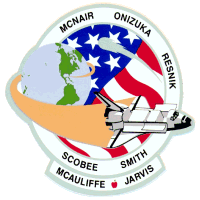Challenger

Commander:
Francis R. (Dick) Scobee, Lieutenant Colonel, USAF
Pilot:
Michael J. Smith, Commander, USN
Mission Specialist:
Judith A. Resnik
Ronald E. McNair
Ellison S. Onizuka, Lieutenant Colonel, USAF
Payload Specialist:
Gregory B. Jarvis
Sharon Christa McAuliffe
NASA now has a Memorial Page honoring those who have been lost in the space program.



































4 comments
There is no progress without failure. We only learn through our mistakes. Blessed be those who taught us through their sacrifices.
While I agree with you on your overall thought, I believe that in this particular case the cause of failure was a known issue with the O-rings in the solid rocket rocket boosters at low temperatures. Those who died deserve respect for their individual belief in exploration, but NASA screwed up. I hope they learned their lesson. As I know from personal experience that atmospheric flying is not without risk, which is why you do everything by the book and use checklists to ensure that safety measures are always followed.
I’ve commented on previous posts you’ve made regarding this tragic disaster. I was there with GD. There was a lot of discussion days & Months after. The same conclusion was always reached, which Dr. Richard Feynman also concluded during the Rogers Commission. It was a disaster that could, and should, have been avoided. As have many disasters created by humans before & since. “Fools rush in…” where there is a buck to be saved!
http://www.feynman.com/science/the-challenger-disaster/
Nothing works in Florida at 0°C. In the winter in Alaska you have to be careful while changing tires because at low temperatures the rubber can shatter. There are much better substances to use at low temperatures, or you simply don’t launch at those temperatures.